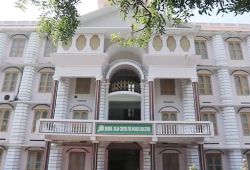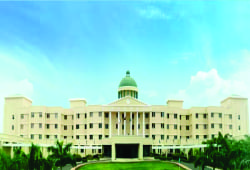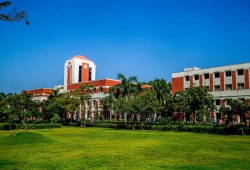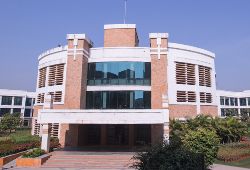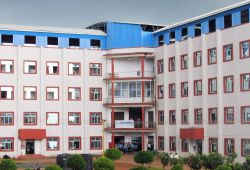If candidates looking for the best Aerospace Engineering colleges in India, then the candidate should participate in the Entrance exam of AME CET 2025. India is well known for the cultural, ethical values and education standards. Apart from traditional engineering, there is Aerospace Engineering in India who became popular due to aviation industry growth in research organization in India. The aviation sector is touching sky so Aerospace Engineering became well-known course. There is best Aerospace Engineering Institute in India to serve education in Aerospace Engineering in India.

Best Aerospace Engg Colleges in India
People who aim to soar through the skies and explore the sky are drawn to the field of aerospace engineering. With its varied educational landscape, India is home to a number of excellent colleges for aerospace engineering. We will examine the top aerospace engineering colleges in India in this post, emphasizing their special qualities and describing why they are outstanding options for prospective aerospace engineers.
| Property | Value |
|---|---|
| Course Name | Aerospace Engineering |
| Full Form | Bachelor of Technology (B.Tech) or Bachelor of Engineering (B.E) in Aerospace Engineering |
| Streams | B.Tech/B.E Aerospace Engineering |
| Course Type | Degree |
| Course Duration | 4 Years |
| Examination Type | Semester wise |
| Eligibility | XII (PCM/PCB), 3 Years Engineering Diploma |
| Admission Process | AME CET (Aircraft Maintenance Engineering Common Entrance Test) |
| Course Fees | 5 to 10 lakhs total course fees |
| Average Salary | Starting Salary: 6 to 10 Lacs per annum |
| Top Recruiting Companies | Boeing, Airbus, Lockheed Martin, NASA, ISRO, DRDO, Bombardier, etc. |
| Top Job Profiles | Aircraft Design Engineer, Avionics Engineer, Manufacturing Engineer, Testing Engineer, Quality Control Engineer, etc. |
Aerospace Engineering Colleges Fees in India
The type of institution, the program level (undergraduate or postgraduate), the particular course, and whether the institution is government-funded or private can all have a substantial impact on the cost of attending an aerospace engineering college in India. An outline of the typical fee ranges is provided below:
- Government-Funded Institutions (IITs and NITs):
- Undergraduate (B.Tech) Programs: Government-funded universities have comparatively lower annual tuition. Depending on the institution and the student's category (general, SC/ST, OBC, etc.), it can range from about INR 30,000 to INR 1,00,000 annually.
- Postgraduate (M.Tech) Programs: Depending on the previously listed factors, the annual cost of M.Tech programs can vary from INR 30,000 to INR 1,00,000.
- Private Institutions:
- Undergraduate (B.Tech) Programs: In India, private universities frequently have higher tuition costs. A B.Tech in aerospace engineering can cost anywhere from INR 50,000 to INR 1,00,000 or more per year.
- Postgraduate (M.Tech) Programs: The annual cost of undergraduate M.Tech programs at private universities can range from INR 50,000 to INR 1,00,000 or more.
- Scholarships and Financial Aid:
- For qualified students, numerous institutions provide financial aid and scholarships, which can drastically lower the cost of education.
- Scholarships can be awarded on the basis of merit, need, or other factors.
- Additional Costs:
- Students should set aside money for living expenses, books, supplies, and housing in addition to tuition. Depending on the city and way of life, these expenses may differ.
- Diploma and Certification Programs:
- Aerospace engineering diploma and certification programs are offered by certain universities; these may be less expensive than full-degree programs.
- Research and PhD Programs:
- Ph.D. programs and other research-based programs can have very different costs. A lot of research scholars get fellowships or stipends to help pay for their studies.
It's important to note that the above fee ranges are approximate and can change over time. For the most up-to-date fee schedules and any financial aid options, it is best to inquire with individual institutions. Additionally, Indian nationals typically pay less at government-funded institutions, and international students may pay different rates.
Eligibility Criteria for Aerospace Engineering Colleges in India
You must fulfill certain eligibility requirements in order to be admitted to Indian aerospace engineering colleges. The following are requirements for prospective students pursuing aerospace engineering:
Admission Eligibility:
- Academic Qualifications: Having a solid background in mathematics, physics, and chemistry and passing the 10+2 exam.
- Entrance Examinations: Passing state-level engineering entrance exams or entrance exams like AME CET, JEE Main and JEE Advanced.
- Minimum Aggregate Marks: Completing the qualifying test with a minimum overall score, usually 50% or above.
- Additional Entrance Exams: Candidates may be required to pass additional entrance exams customised to their college.
- Age and Nationality: As part of their eligibility requirements, some colleges might have particular age restrictions or nationality requirements.
Campus Facilities in India for Aero Engineering Colleges
For practical training and research, aerospace engineering depends on specialized infrastructure and facilities. Modern amenities are provided by aerospace engineering colleges in India, including:
- Aircraft Maintenance Hangars: Hangars on campus offer hands-on training in aircraft repair and maintenance.
- Rich Library Resources: A vast collection of books, research papers, and internet resources are available for students to use when conducting research in well-stocked libraries.
- Aviation Workshops: Workshops provide hands-on experience in aircraft engineering by providing the tools and equipment needed to construct and modify aircraft components.
- Computer Labs: With software for engineering projects and aerodynamic simulations, computer labs allow students to use technology in their education.
- Interactive Classrooms: Through the use of audio-visual aids, interactive learning is made possible in modern classrooms, improving the educational process.
- Research Centers: Committed to state-of-the-art aerospace research, offering students chances to work on creative projects.
- Hostel Facilities: On-campus housing promotes a feeling of community and brotherhood while ensuring students' safety and convenience.
- Sports and Recreation: Sports fields, gyms, and cultural clubs provide a well-rounded lifestyle that supports students' mental and physical health.
Admission Process at Aerospace Engineering Colleges in India
The following steps are commonly included in the Aerospace Engineering admissions process:
- Meet the Eligibility Criteria: Candidates must fulfill specific eligibility requirements, which can differ from one university to another, in order to pursue a degree in aerospace engineering. However, completing 10+2 (or an equivalent) with physics, chemistry, and mathematics as required subjects is frequently one of the general requirements. Scores from engineering entrance exams, such as JEE Main, or other relevant national or state-level exams may also be taken into account by certain institutions.
- Entrance Examination: Candidates must take a relevant entrance exam at many universities and colleges that offer programs in aerospace engineering. The purpose of these tests is to evaluate the candidates' scientific and engineering knowledge and skills. Usually, the results of these tests play a significant role in the admissions process.
- Application and Documentation: Applicants must complete an application that the organization they want to join provides. They must submit the application and a number of supporting documents, such as:
- Educational certificates and transcripts, such as 10+2 marksheets.
- Scorecard of the entrance examination (if applicable).
- Proof of identity, often in the form of a government-issued ID.
- Passport-sized photographs.
- Domicile certificate (if required by the institution).
- Category certificate (if applicable, for reserved category candidates).
- Personal Statement and Letters of Recommendation: A personal statement or essay describing the applicant's motivation, objectives, and interest in aerospace engineering may be required by certain universities. They might also be required to submit recommendation letters from instructors or other experts who can attest to their character and academic prowess.
- Counselling: Candidates may be invited for a counseling session or entrance interview, depending on the institution. The faculty or admission committee may assess the applicant's fit for the program and respond to any queries they may have during these exchanges.
- Payment of Fees: A candidate must pay the necessary fees to confirm their admission to the Aerospace Engineering program after receiving an offer of admission. Tuition, registration, and other associated fees are usually included in these fees.
Aerospace Engineering Colleges Syllabus in India
Aerospace engineering programs in India offer a comprehensive curriculum that covers various subjects throughout the four-year duration of the program. Here's an overview of the typical course syllabus:
First Year Subjects
Semester 1
- Calculus
- Physics - I
- Chemistry
- Basic Electrical Engineering
- Communication Skills
- Environmental Science and Engineering
- Physics Lab
- Basic Engineering Lab
Semester 2
- Vector Calculus and Ordinary Differential Equations
- Physics - II
- Material Science and Metallurgy
- Basic Electronic Engineering
- Engineering Graphics
- Computer Programming and Application
- Basic Electrical and Electronics Engineering Lab
- Chemistry Lab
Second Year Subjects
Semester 3
- Linear Algebra, Complex Analysis, and Fourier Series
- Engineering Thermodynamics
- Mechanics of Solids
- Fluid Mechanics
- Materials Processing Techniques
- Introduction to Economics
- Introduction to Machine Elements and Drawing
- Strength of Materials Lab
Semester 4
- Integral Transforms, PDE, and Calculus of Variations
- Aerodynamics
- Heat Transfer
- Applied Dynamics and Vibration
- Machining and Precision Manufacturing
- Introduction to Social Science and Ethics
- Metrology and Computer-Aided Inspection
- Thermal and Fluid Lab
Third Year Subjects
Semester 5
- Probability, Statistics, and Numerical Methods
- Compressible Flow
- Atmospheric Flight Mechanics
- Spaceflight Mechanics
- Theory of Elasticity
- Automatic Control
- Aerodynamics Lab
- Manufacturing Processes Lab
Semester 6
- Air-Breathing Propulsion
- Aerospace Structures
- Optimization Techniques in Engineering
- Principles of Management Systems
- Elective I
- Elective II
- Aerospace Structures Lab
- Modeling and Analysis Lab
Fourth Year Subjects
Semester 7
- Rocket Propulsion
- Aerospace Vehicle Design
- Environmental Science and Engineering
- Elective III
- Elective IV
- Flight Mechanics and Propulsion Lab
- Instrumentation and Control Systems Lab I
- Summer Internship and Training
Semester 8
- Comprehensive Viva-Voce
- Project Work
Aerospace Engineering Entrance Exam in India
For students hoping to enroll in aerospace engineering programs at Indian colleges and universities, entrance exams are a vital first step. India provides a range of aerospace engineering programs due to its long history in aviation and aerospace, and entrance exams are an essential part of the admissions process. The following are a few prominent entrance exams accepted for admission to Indian aerospace engineering programs:
- Joint Entrance Examination (JEE) Main: The esteemed national entrance exam known as JEE Main assesses applicants' proficiency in mathematics, physics, and chemistry. For admission to their aerospace engineering programs, numerous esteemed engineering colleges in India take into account JEE Main scores.
- State-Level Engineering Entrance Exams: In order to gain admission to aerospace engineering programs in their respective states, each Indian state administers its own engineering entrance exams. WBJEE (West Bengal), MHT-CET (Maharashtra), and EAMCET (Andhra Pradesh and Telangana) are a few examples.
- University-Specific Entrance Exams: For aerospace engineering and related programs, certain Indian universities and institutions may administer their own special entrance exams. These tests are designed to evaluate topics related to aerospace engineering and meet the institution's particular requirements.
- Aircraft Maintenance Engineering Common Entrance Test (AME CET): For students hoping to work as aircraft maintenance engineers or pursue careers in aviation, the AME CET is a crucial entrance exam. AME CET results are accepted for admission to a number of Indian universities that offer aerospace and aviation programs.
Students who are interested in studying aerospace engineering in India should carefully examine the prerequisites for admission as well as the particular entrance tests that the colleges and universities they want to apply to accept. In India, a nation that is becoming more and more prominent in the aerospace and aviation industries, selecting the appropriate entrance exam and putting in a lot of study time are essential first steps towards starting a prosperous aerospace engineering career.
Download Brochure for Aerospace Engineering Colleges in India
Download the brochure for Indian aerospace engineering colleges to get your career started in the aerospace sector. With comprehensive details about the colleges, programs, faculty, facilities, and admissions processes, this brochure is a great resource. When selecting a college and program that complement your academic and professional objectives, it can assist you in making an informed choice.
Specializations at Aerospace Engineering Colleges in India
With the variety of specializations offered by Indian aerospace engineering programs, students can customize their education to focus on particular aspects of the aerospace sector. Among the important specializations that students can choose from are:
- Aircraft Design and Manufacturing: Discusses aerodynamics, structural design, materials, and manufacturing processes in relation to the development of aircraft. Students become proficient in creating safe and effective aircraft designs.
- Aerospace Propulsion: Focuses on propulsion systems, rockets, and aircraft engines. Students gain knowledge of engine design, flight mechanics, and propulsion principles.
- Avionics and Control Systems: Focuses on the electronic systems found in aircrafts, such as flight control, navigation, and communication. This area of expertise explores the technology that maintains the efficiency and safety of aircrafts.
- Aircraft Maintenance and Repair: Focuses on maintaining, inspecting, and repairing aircraft to guarantee their safety and airworthiness.
- Space Technology and Exploration: Discusses satellite technology, space mission planning, and spacecraft design. Projects involving satellites, space missions, and interplanetary exploration may be undertaken by students.
- Aeronautical Research and Development: Focuses on cutting-edge aeronautics research, involving students in projects that challenge the limits of aerospace innovation and technology.
- Unmanned Aerial Vehicles (UAVs) and Drones: Focuses on the development, use, and operation of unmanned aerial vehicles for data collection, delivery, and surveillance.
- Aerospace Management: Covering subjects like airline management, aviation marketing, and aviation operations, and aimed at students who are interested in the business side of the aviation sector.
Course Duration at Aerospace Engineering Colleges in India
The foundation for a career in aerospace engineering is laid by the bachelor's degree program that most aerospace engineering programs in India start with. Typically, this undergraduate program lasts four years. The basic concepts of aeronautics and astronautics, such as aerodynamics, aerospace structures, propulsion systems, and flight mechanics, are taught to students during this period. These four years are packed with coursework, hands-on training, and projects that give students the skills and knowledge they need to succeed in this rapidly industry.
For those interested in pursuing higher education or specialization, master's and Ph.D. programs may vary in duration, typically spanning one to two years for a master's degree and several years for a Ph.D., depending on the specific college and level of study.
Top Recruiters for Aerospace Engineering Graduates in India
Graduates of aerospace engineering programs in India can choose from a variety of positions with leading employers in the industry. Among the well-known recruiters are:
- Indian Space Research Organization (ISRO): Provides employment opportunities in space exploration projects, rocket propulsion, and satellite development.
- Defence Research and Development Organization (DRDO): Involves aerospace engineers in defense technology projects, such as research into military aircraft, avionics systems, and missile development.
- Hindustan Aeronautics Limited (HAL): A large aerospace and defense firm that hires aerospace engineers for jobs in the production of aircraft and helicopters.
- Bharat Heavy Electricals Limited (BHEL): Employs aerospace engineers to work on power-generating gas turbine equipment.
- National Aeronautics Laboratory (NAL): Focuses on aerospace research; aerodynamics, wind tunnel testing, and aircraft design are all aided by aerospace engineers.
- Air India: To ensure flight safety, the national carrier hires aerospace engineers for aircraft engineering and maintenance.
- Private Aerospace Companies: Numerous career options in aerospace technology and manufacturing are offered by organizations such as Tata Advanced Systems, L&T, and Mahindra Aerospace.
- Aviation Companies: Aerospace engineers are employed by airlines like IndiGo, SpiceJet, and Vistara for positions involving aircraft maintenance and safety.
- Research and Development Centers: Graduates in aerospace engineering can work on innovative projects at universities, research facilities, and private companies.
- Consulting and Engineering Firms: Aerospace divisions of consulting giants like Wipro, TCS, and Infosys provide engineering solutions to the aviation and aerospace sector.


